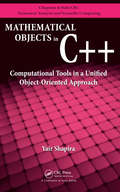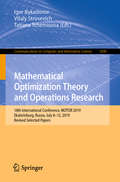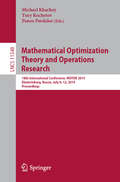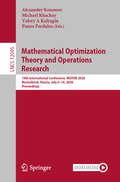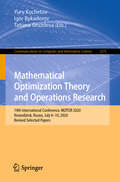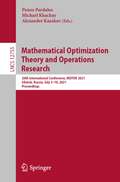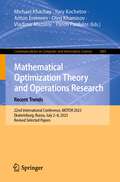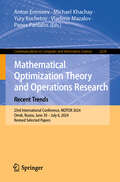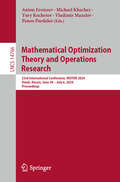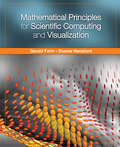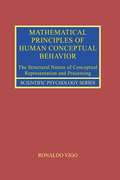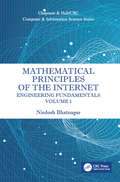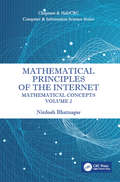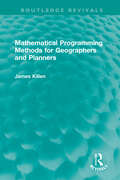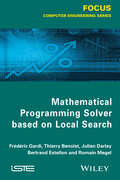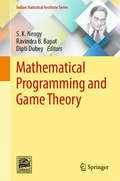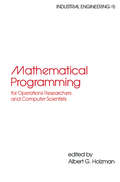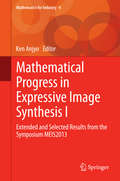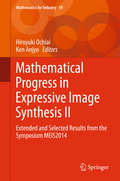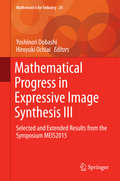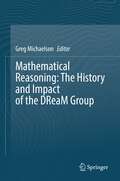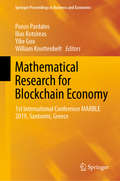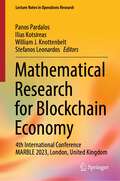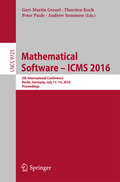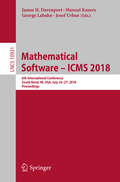- Table View
- List View
Mathematical Objects in C++: Computational Tools in A Unified Object-Oriented Approach (Chapman & Hall/CRC Numerical Analysis and Scientific Computing Series)
by Yair ShapiraEmphasizing the connection between mathematical objects and their practical C++ implementation, this book provides a comprehensive introduction to both the theory behind the objects and the C and C++ programming. Object-oriented implementation of three-dimensional meshes facilitates understanding of their mathematical nature. Requiring no prerequis
Mathematical Optimization Theory and Operations Research: 18th International Conference, MOTOR 2019, Ekaterinburg, Russia, July 8 - 12, 2019, Revised Selected Papers (Communications in Computer and Information Science #1090)
by Tatiana Tchemisova Igor Bykadorov Vitaly StrusevichThis book constitutes revised and selected papers from the 18th International Conference on Mathematical Optimization Theory and Operations Research, MOTOR 2019, held in Ekaterinburg, Russia, in July 2019. The 40 full papers and 4 short papers presented in this volume were carefully reviewed and selected from a total of 170 submissions. The papers in the volume are organised according to the following topical headings: combinatorial optimization; game theory and mathematical economics; data mining and computational geometry; integer programming; mathematical programming; operations research; optimal control and applications.
Mathematical Optimization Theory and Operations Research: 18th International Conference, MOTOR 2019, Ekaterinburg, Russia, July 8-12, 2019, Proceedings (Lecture Notes in Computer Science #11548)
by Panos Pardalos Yury Kochetov Michael KhachayThis book constitutes the proceedings of the 18th International Conference on Mathematical Optimization Theory and Operations Research, MOTOR 2019, held in Ekaterinburg, Russia, in July 2019.The 48 full papers presented in this volume were carefully reviewed and selected from 170 submissions. MOTOR 2019 is a successor of the well-known International and All-Russian conference series, which were organized in Ural, Siberia, and the Far East for a long time. The selected papers are organized in the following topical sections: mathematical programming; bi-level optimization; integer programming; combinatorial optimization; optimal control and approximation; data mining and computational geometry; games and mathematical economics.
Mathematical Optimization Theory and Operations Research: 19th International Conference, MOTOR 2020, Novosibirsk, Russia, July 6–10, 2020, Proceedings (Lecture Notes in Computer Science #12095)
by Panos Pardalos Michael Khachay Alexander Kononov Valery A KalyaginThis book constitutes the proceedings of the 19th International Conference on Mathematical Optimization Theory and Operations Research, MOTOR 2020, held in Novosibirsk, Russia, in July 2020. The 31 full papers presented in this volume were carefully reviewed and selected from 102 submissions. The papers are grouped in these topical sections: discrete optimization; mathematical programming; game theory; scheduling problem; heuristics and metaheuristics; and operational research applications.
Mathematical Optimization Theory and Operations Research: 19th International Conference, MOTOR 2020, Novosibirsk, Russia, July 6–10, 2020, Revised Selected Papers (Communications in Computer and Information Science #1275)
by Yury Kochetov Igor Bykadorov Tatiana GruzdevaThis book constitutes refereed proceedings of the 19th International Conference on Mathematical Optimization Theory and Operations Research, MOTOR 2020, held in July 2020. Due to the COVID-19 pandemic the conference was held online. The 25 full papers and 8 short papers presented in this volume were carefully reviewed and selected from a total of 102 submissions. The papers in the volume are organised according to the following topical headings: combinatorial optimization; mathematical programming; global optimization; game theory and mathematical economics; heuristics and metaheuristics; machine learning and data analysis.
Mathematical Optimization Theory and Operations Research: 20th International Conference, MOTOR 2021, Irkutsk, Russia, July 5–10, 2021, Proceedings (Lecture Notes in Computer Science #12755)
by Panos Pardalos Michael Khachay Alexander KazakovThis book constitutes the proceedings of the 20th International Conference on Mathematical Optimization Theory and Operations Research, MOTOR 2021, held in Irkutsk, Russia, in July 2021. The 29 full papers and 1 short paper presented in this volume were carefully reviewed and selected from 102 submissions. Additionally, 2 full invited papers are presented in the volume. The papers are grouped in the following topical sections: combinatorial optimization; mathematical programming; bilevel optimization; scheduling problems; game theory and optimal control; operational research and mathematical economics; data analysis.
Mathematical Optimization Theory and Operations Research: 22nd International Conference, MOTOR 2023, Ekaterinburg, Russia, July 2–8, 2023, Revised Selected Papers (Communications in Computer and Information Science #1881)
by Panos Pardalos Yury Kochetov Michael Khachay Anton Eremeev Vladimir Mazalov Oleg KhamisovThis book constitutes refereed proceedings of the 22nd International Conference on Mathematical Optimization Theory and Operations Research: Recent Trends, MOTOR 2023, held in Ekaterinburg, Russia, during July 2–8, 2023. The 28 full papers and one invited paper presented in this volume were carefully reviewed and selected from a total of 61 submissions. The papers in the volume are organized according to the following topical headings: mathematical programming; stochastic optimization; discrete and combinatorial optimization; operations research; optimal control and mathematical economics; and optimization in machine learning.
Mathematical Optimization Theory and Operations Research: 23rd International Conference, MOTOR 2024, Omsk, Russia, June 30 – July 6, 2024, Revised Selected Papers (Communications in Computer and Information Science #2239)
by Panos Pardalos Yury Kochetov Michael Khachay Anton Eremeev Vladimir MazalovThis book constitutes the revised selected papers from the 23rd International Conference on Mathematical Optimization Theory and Operations Research, MOTOR 2024, held in Omsk, Russia from June 30 to July 06, 2024. The 26 full papers included in this book were carefully reviewed and selected from 79 submissions. These papers have been organized in the following topical sections: Mathematical programming; Combinatorial optimization; Operations research; and Machine learning and optimization.
Mathematical Optimization Theory and Operations Research: 23rd International Conference, MOTOR 2024, Omsk, Russia, June 30–July 6, 2024, Proceedings (Lecture Notes in Computer Science #14766)
by Panos Pardalos Yury Kochetov Michael Khachay Anton Eremeev Vladimir MazalovThis book constitutes the refereed proceedings of the 23rd International Conference on Mathematical Optimization Theory and Operations Research, MOTOR 2024, held in Omsk, Russia, during June 30 - July 6, 2024. The 30 full papers included in this book were carefully reviewed and selected from 79 submissions. This book also contains two invited talk. They were organized in topical sections as follows: mathematical programming; combinatorial optimization; game theory; and operations research.
Mathematical Principles for Scientific Computing and Visualization
by Gerald Farin Dianne HansfordThis non-traditional introduction to the mathematics of scientific computation describes the principles behind the major methods, from statistics, applied mathematics, scientific visualization, and elsewhere, in a way that is accessible to a large part of the scientific community. Introductory material includes computational basics, a review of coo
Mathematical Principles of Human Conceptual Behavior: The Structural Nature of Conceptual Representation and Processing (Scientific Psychology Series)
by Ronaldo VigoThe ability to learn concepts lies at the very core of human cognition, enabling us to efficiently classify, organize, identify, and store complex information. In view of the basic role that concepts play in our everyday physical and mental lives, the fields of cognitive science and psychology face three long standing challenges: discovering the laws that govern concept learning and categorization behavior in organisms, showing how they inform other areas of cognitive research, and describing them with the mathematical systematicity and precision found in the physical sciences. In light of these theoretical and methodological shortcomings, this volume will introduce a set of general mathematical principles for predicting and explaining conceptual behavior. The author’s theory is based on seven fundamental constructs of universal science: invariance, complexity, information, similarity, dissimilarity, pattern, and representation. These constructs are joined by a novel mathematical framework that does not depend on probability theory, and derives key results from conceptual behavior research with other key areas of cognitive research such as pattern perception, similarity assessment, and contextual choice. The result is a unique and systematic unifying foundation for cognitive science in the tradition of classical physics.
Mathematical Principles of the Internet, Volume 1: Engineering (Chapman & Hall/CRC Computer and Information Science Series)
by Nirdosh BhatnagarThis two-volume set on Mathematical Principles of the Internet provides a comprehensive overview of the mathematical principles of Internet engineering. The books do not aim to provide all of the mathematical foundations upon which the Internet is based. Instead, they cover a partial panorama and the key principles. Volume 1 explores Internet engineering, while the supporting mathematics is covered in Volume 2. The chapters on mathematics complement those on the engineering episodes, and an effort has been made to make this work succinct, yet self-contained. Elements of information theory, algebraic coding theory, cryptography, Internet traffic, dynamics and control of Internet congestion, and queueing theory are discussed. In addition, stochastic networks, graph-theoretic algorithms, application of game theory to the Internet, Internet economics, data mining and knowledge discovery, and quantum computation, communication, and cryptography are also discussed. In order to study the structure and function of the Internet, only a basic knowledge of number theory, abstract algebra, matrices and determinants, graph theory, geometry, analysis, optimization theory, probability theory, and stochastic processes, is required. These mathematical disciplines are defined and developed in the books to the extent that is needed to develop and justify their application to Internet engineering.
Mathematical Principles of the Internet, Volume 2: Mathematics (Chapman & Hall/CRC Computer and Information Science Series)
by Nirdosh BhatnagarThis two-volume set on Mathematical Principles of the Internet provides a comprehensive overview of the mathematical principles of Internet engineering. The books do not aim to provide all of the mathematical foundations upon which the Internet is based. Instead, they cover a partial panorama and the key principles. Volume 1 explores Internet engineering, while the supporting mathematics is covered in Volume 2. The chapters on mathematics complement those on the engineering episodes, and an effort has been made to make this work succinct, yet self-contained. Elements of information theory, algebraic coding theory, cryptography, Internet traffic, dynamics and control of Internet congestion, and queueing theory are discussed. In addition, stochastic networks, graph-theoretic algorithms, application of game theory to the Internet, Internet economics, data mining and knowledge discovery, and quantum computation, communication, and cryptography are also discussed. In order to study the structure and function of the Internet, only a basic knowledge of number theory, abstract algebra, matrices and determinants, graph theory, geometry, analysis, optimization theory, probability theory, and stochastic processes, is required. These mathematical disciplines are defined and developed in the books to the extent that is needed to develop and justify their application to Internet engineering.
Mathematical Programming Methods for Geographers and Planners (Routledge Revivals)
by James KillenOriginally published in 1983, this was the first text to offer an in-depth treatment of mathematical programming methods explained from first principles. It considers all the major programming techniques and fully explains key terms, illustrates theories with detailed examples and shows how the various skills are applied in practice. It will be invaluable in both the academic world and to policy formulators and planners, who make extensive use of the methods described.
Mathematical Programming Solver Based on Local Search
by Frédéric Gardi Thierry Benoist Julien Darlay Bertrand Estellon Romain MegelThis book covers local search for combinatorial optimization and its extension to mixed-variable optimization. Although not yet understood from the theoretical point of view, local search is the paradigm of choice for tackling large-scale real-life optimization problems. Today's end-users demand interactivity with decision support systems. For optimization software, this means obtaining good-quality solutions quickly. Fast iterative improvement methods, like local search, are suited to satisfying such needs. Here the authors show local search in a new light, in particular presenting a new kind of mathematical programming solver, namely LocalSolver, based on neighborhood search. First, an iconoclast methodology is presented to design and engineer local search algorithms. The authors' concern regarding industrializing local search approaches is of particular interest for practitioners. This methodology is applied to solve two industrial problems with high economic stakes. Software based on local search induces extra costs in development and maintenance in comparison with the direct use of mixed-integer linear programming solvers. The authors then move on to present the LocalSolver project whose goal is to offer the power of local search through a model-and-run solver for large-scale 0-1 nonlinear programming. They conclude by presenting their ongoing and future work on LocalSolver toward a full mathematical programming solver based on local search.
Mathematical Programming and Game Theory (Indian Statistical Institute Series)
by Ravindra B. Bapat S. K. Neogy Dipti DubeyThis book discusses recent developments in mathematical programming and game theory, and the application of several mathematical models to problems in finance, games, economics and graph theory. All contributing authors are eminent researchers in their respective fields, from across the world. This book contains a collection of selected papers presented at the 2017 Symposium on Mathematical Programming and Game Theory at New Delhi during 9–11 January 2017. Researchers, professionals and graduate students will find the book an essential resource for current work in mathematical programming, game theory and their applications in finance, economics and graph theory. The symposium provides a forum for new developments and applications of mathematical programming and game theory as well as an excellent opportunity to disseminate the latest major achievements and to explore new directions and perspectives.
Mathematical Programming for Operations Researchers and Computer Scientists
by Albert G. HolzmanThis book covers the fundamentals of linear programming, extension of linear programming to discrete optimization methods, multi-objective functions, quadratic programming, geometric programming, and classical calculus methods for solving nonlinear programming problems.
Mathematical Progress in Expressive Image Synthesis I
by Ken AnjyoThis book presents revised versions of the best papers selected from the symposium "Mathematical Progress in Expressive Image Synthesis" (MEIS2013) held in Fukuoka, Japan, in 2013. The topics cover various areas of computer graphics (CG), such as surface deformation/editing, character animation, visual simulation of fluids, texture and sound synthesis and photorealistic rendering. From a mathematical point of view, the book also presents papers addressing discrete differential geometry, Lie theory, computational fluid dynamics, function interpolation and learning theory. This book showcases the latest joint efforts between mathematicians, CG researchers and practitioners exploring important issues in graphics and visual perception. The book provides a valuable resource for all computer graphics researchers seeking open problem areas, especially those now entering the field who have not yet selected a research direction.
Mathematical Progress in Expressive Image Synthesis II
by Hiroyuki Ochiai Ken AnjyoThe material included in this book provides selected presentations given at the international symposium MEIS2014. The book aims to provide a unique venue where various issues in computer graphics (CG) application fields are discussed by mathematicians as well as CG researchers and practitioners. The target audience is not limited to researchers in academia but also those in industries with a strong interest in digital media creation, scientific visualization and visual engineering.
Mathematical Progress in Expressive Image Synthesis III
by Yoshinori Dobashi Hiroyuki Ochiai"Progress in Expressive Image Synthesis"(MEIS2015), was held in Fukuoka, Japan, September 25-27, 2015. The aim of thesymposium was to provide a unique venue where various issues in computergraphics (CG) application fields could be discussed by mathematicians, CGresearchers, and practitioners. Through the previous symposiums MEIS2013 andMEIS2014, mathematicians as well as CG researchers have recognized that CG is aspecific and practical activity derived from mathematical theories. Issuesfound in CG broaden the field of mathematics and vice versa, and CG visualizesmathematical theories in an aesthetic manner. In this volume, the editors aim toprovoke interdisciplinary research projects through the peer-reviewed papersand poster presentations at the this year's symposium. This book capturesinteractions among mathematicians, CG researchers, and practitioners sharingimportant, state-of-the-art issues in graphics and visual perception. The bookis suitable for all CG researchers seeking open problem areas and especiallyfor those entering the field who have not yet selected a research direction.
Mathematical Reasoning: The History and Impact of the DReaM Group
by Greg MichaelsonThis collection of essays examines the key achievements and likely developments in the area of automated reasoning. In keeping with the group ethos, Automated Reasoning is interpreted liberally, spanning underpinning theory, tools for reasoning, argumentation, explanation, computational creativity, and pedagogy. Wider applications including secure and trustworthy software, and health care and emergency management. The book starts with a technically oriented history of the Edinburgh Automated Reasoning Group, written by Alan Bundy, which is followed by chapters from leading researchers associated with the group. Mathematical Reasoning: The History and Impact of the DReaM Group will attract considerable interest from researchers and practitioners of Automated Reasoning, including postgraduates. It should also be of interest to those researching the history of AI.
Mathematical Research for Blockchain Economy: 1st International Conference MARBLE 2019, Santorini, Greece (Springer Proceedings in Business and Economics)
by Panos Pardalos Ilias Kotsireas William Knottenbelt Yike GuoThis book presents the best papers from the 1st International Conference on Mathematical Research for Blockchain Economy (MARBLE) 2019, held in Santorini, Greece. While most blockchain conferences and forums are dedicated to business applications, product development or Initial Coin Offering (ICO) launches, this conference focused on the mathematics behind blockchain to bridge the gap between practice and theory. Every year, thousands of blockchain projects are launched and circulated in the market, and there is a tremendous wealth of blockchain applications, from finance to healthcare, education, media, logistics and more. However, due to theoretical and technical barriers, most of these applications are impractical for use in a real-world business context. The papers in this book reveal the challenges and limitations, such as scalability, latency, privacy and security, and showcase solutions and developments to overcome them.
Mathematical Research for Blockchain Economy: 4th International Conference MARBLE 2023, London, United Kingdom (Lecture Notes in Operations Research)
by Panos Pardalos Ilias Kotsireas William J. Knottenbelt Stefanos LeonardosThis book presents the best papers from the 4th International Conference on Mathematical Research for Blockchain Economy (MARBLE) 2023, held in London, UK. While most blockchain conferences and forums are dedicated to business applications, product development, or Initial Coin Offering (ICO) launches, this conference focused on the mathematics behind blockchain to bridge the gap between practice and theory. The book spans the divide between theoretical promise and practical reality in blockchain technology and explores the challenges hindering its real-world integration across diverse sectors, offering comprehensive insights into issues like scalability, security, and privacy.
Mathematical Software - ICMS 2016
by Peter Paule Gert-Martin Greuel Thorsten Koch Andrew SommeseThis book constitutes the proceedings of the 5th International Conference on Mathematical Software, ICMS 2015, held in Berlin, Germany, in July 2016. The 68 papers included in this volume were carefully reviewed and selected from numerous submissions. The papers are organized in topical sections named: univalent foundations and proof assistants; software for mathematical reasoning and applications; algebraic and toric geometry; algebraic geometry in applications; software of polynomial systems; software for numerically solving polynomial systems; high-precision arithmetic, effective analysis, and special functions; mathematical optimization; interactive operation to scientific artwork and mathematical reasoning; information services for mathematics: software, services, models, and data; semDML: towards a semantic layer of a world digital mathematical library; miscellanea.
Mathematical Software – ICMS 2018: 6th International Conference, South Bend, IN, USA, July 24-27, 2018, Proceedings (Lecture Notes in Computer Science #10931)
by James H. Davenport Manuel Kauers George Labahn Josef UrbanThis book constitutes the proceedings of the 6th International Conference on Mathematical Software, ICMS 2018, held in South Bend, IN, USA, in July 2018.The 59 papers included in this volume were carefully reviewed and selected from numerous submissions. The program of the 2018 meeting consisted of 20 topical sessions, each of which providing an overview of the challenges, achievements and progress in a subeld of mathematical software research, development and use.
